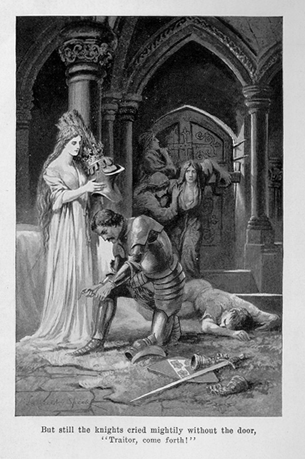
I Saw Guinevere There as Well, the Woman I Love Best of All...

Numerous sources, such as Layamon's "Arthur's Dream", Marie de France's "Lanval" and Sir Thomas Malory's Morte Darthur, portray Guinevere as a unfaithful wife and the primary cause of the fall of King Arthur and The Round Table. In all of the three works, Guinevere is seen approaching various men such as Lanval and Sir Lancelot, knights of her husband. And, yet, she remains virtuous and appealing in the eyes of King Arthur, who loves her dearly. Such blindness or possibly Arthur's unconditional love of Guinevere and Lancelot, Arthur's best knight, lead to the fall of Arthur's Britain and of the Round Table.
In one of her lays, "Lanval", Marie de France presents Guinevere approaching the main character,Lanval, one of Arthur's knights, with a proposition. She offers herself to Lanval to be his mistress, willing to satisfy his sexual joys:
Lanval, I've honored you sincerely, Have cherished you and loved you dearly. All my love is at your disposal. Your mistress I consent to be; You should receive much joy from me (257- 262).Such behavior is clearly unacceptable for a lady in Guinevere's position. She does not only compromise herself, but also presents Arthur as a weak man, unable to control his wife, and therefore a weak ruler. Furthermore, the author of the tale portrays Guinevere as a very wicked character. Angered by Lanval's rejection of her approaches, Guinevere insults Lanval, calling him a homosexual:
Often I have heard men aver That women are not what you prefer. But you have many pretty boys With whom you like to take your joys (273-276).Moreover, Guinevere later manufactures a story to tell Arthur, in which the roles are reversed and Lanval is presented as approaching Guinevere:
Lanval has done me infamy. To be his lover he had affected (310-311).Unlike in Beowulf, where women play the role of peace-weavers and cupbearers between the tribes, Guinevere imposes chaos on Arthur's court, causing conflicts between her husband and his knights, instead of making the rule of Arthur more prosperous and strong.
In "Arthur's Dream" by Layamon, King Arthur envisions the fall of his empire through a dream. In this dream Arthur sees Guinevere pulling down the walls of the hall Arthur is sitting on. In this case the hall represents Arthur's kingdom and everything that Arthur has achieved -- greatness, power, unity of his people, support and respect of his knights:
There came to me a dream which has made me most depressed; I dreamed someone had lifted me right on top of some hall All the lands which I possess, all of them I was surveying... Then Modred came... carrying in his hand a massive battle-axe. He started to hew... and hacked down all the posts which were holding up the hall. I saw Guinevere there as well, the woman I love best of all: The whole roof of that enormous hall with her hands she was pulling down (13983 - 13993).
 Sir Thomas Malory's Morte Darthur describes the final days of Arthur's empire. Guinevere and her affair with Sir Lancelot serve as one of the causes of the crash. Guinevere's behavior weakens the prestige and power of Arthur. She is as a soft spot in Arthur's heart, who loves her dearly. Evil Sir Mordred and Sir Agravain know it and they take advantage of this situation. Publicly insulting Lancelot and making his affair with the queen public, the two knights trigger the violent reaction of Lancelot, who kills twelve of Arthur's knights: "And then Lancelot set open the chamber door and mightily and knightly he strode in among them. And anon at the first stroke he slew Sir Agravain, and after twelve of his fellow" (Malory, 426). From then on, there is no turning back. Without a queen and his loyal knights, including Lancelot, Arthur faces the final blow from Mordred, his illegitimate son, and dies in battle.
Sir Thomas Malory's Morte Darthur describes the final days of Arthur's empire. Guinevere and her affair with Sir Lancelot serve as one of the causes of the crash. Guinevere's behavior weakens the prestige and power of Arthur. She is as a soft spot in Arthur's heart, who loves her dearly. Evil Sir Mordred and Sir Agravain know it and they take advantage of this situation. Publicly insulting Lancelot and making his affair with the queen public, the two knights trigger the violent reaction of Lancelot, who kills twelve of Arthur's knights: "And then Lancelot set open the chamber door and mightily and knightly he strode in among them. And anon at the first stroke he slew Sir Agravain, and after twelve of his fellow" (Malory, 426). From then on, there is no turning back. Without a queen and his loyal knights, including Lancelot, Arthur faces the final blow from Mordred, his illegitimate son, and dies in battle.
All of the three sources, "Lanval," by Marie de France, "Arthur's Dream," by Layamon, and Morte Darthur, by Sir Thomas Malory, present Guinevere, Arthur's queen, as one of the causes of the fall of Arthurian empire. Guinevere is described as a wicked and unfaithful wife, whose behavior triggers the fall of her husband's rule. And although other factors, such as people's jealousy and evil, influence the outcome of the legendary empire, Guinevere's unfaithfulness is the primary cause of the fall of King Arthur and his Round Table.